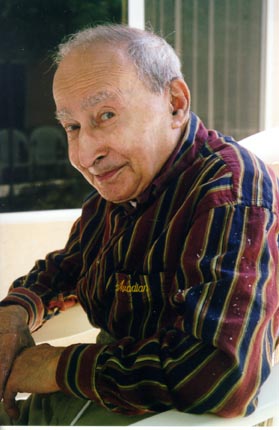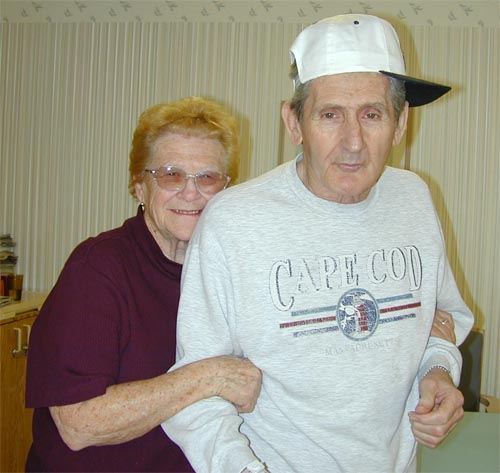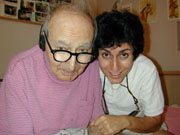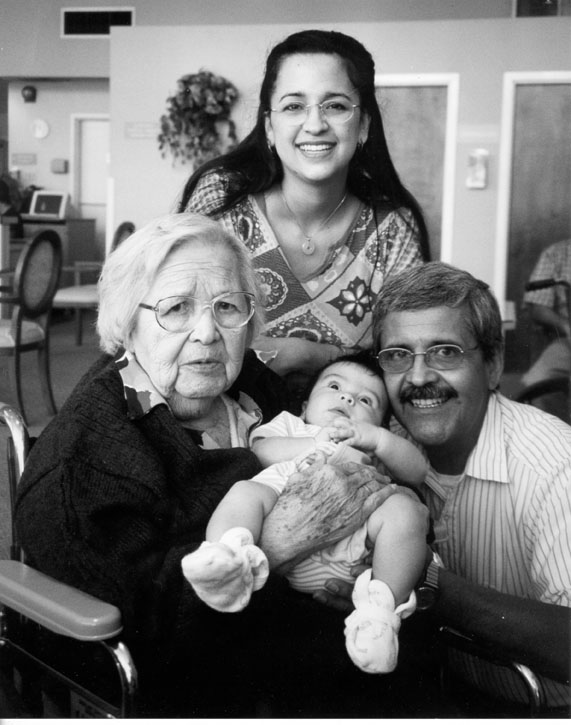- Home
- Caregiving Topics
- Books
- Speaker
- Resources
- TCV Community
- About / Contact TCV


 One November afternoon in 1999, when my father was still able to draw on his sense of humor, I pulled out a mirror and held it in front of his face. “See that face?” I asked. As my father looked at his reflection, I joked, “That’s a face only a mother could love.” While continuing to stare at his reflection he replied with the greatest of sincerity, “A mother couldn’t be that discreet.”
One November afternoon in 1999, when my father was still able to draw on his sense of humor, I pulled out a mirror and held it in front of his face. “See that face?” I asked. As my father looked at his reflection, I joked, “That’s a face only a mother could love.” While continuing to stare at his reflection he replied with the greatest of sincerity, “A mother couldn’t be that discreet.”
—Brenda Avadian, MA
CareGiver
Two words that come together
When you speak of someone dear.
It is that special person
If you call, they’re always near.
You’ll see that in a “Care-Giver”
Love comes from in their Heart.
With loving hands and guidance
They help each new day start.
Caring for the fragile soul,
Giving day to day.
They meet the needs of loved ones
Spreading love along the way.
A gentle touch,
a helping hand,
A glow that makes you smile.
Always near to comfort
And go that extra mile.
They want no fame or glory,
And it puts their mind at ease,
To know they’ve helped a loved one
Deal with Alzheimer’s disease.
So show a little kindness
To CareGivers across this land.
You may be the one someday
Who needs a helping hand.
With Peace
and Understanding
Throughout the end of time.
There’s someone who will care for you
And make your spirit shine …
The CareGiver …
—Loraine Yates (Willo)
A Bedtime Story
 My husband, Don, was diagnosed with Alzheimer’s disease in 1992. He was sixty-seven years old and we had been married for forty-six years. We had many happy years together, we traveled a lot and, most of all, we enjoyed our grandchildren.
My husband, Don, was diagnosed with Alzheimer’s disease in 1992. He was sixty-seven years old and we had been married for forty-six years. We had many happy years together, we traveled a lot and, most of all, we enjoyed our grandchildren.
Don is an easygoing person with a quiet demeanor. When he said or did anything out of the ordinary, I had a hard time with it at first, but I knew I had to accept his condition. As the disease progressed he would do really odd and funny things.
He had been getting up at night and wouldn’t come back to bed. One predawn morning at about 3:00, he decided to get up.
I was so tired of getting up with him each time, I stayed in bed and begged him, “Don, please come back to bed.”
He was reluctant, yet as he crawled back into bed, he replied, “I don’t think my wife would appreciate me going to bed with you!”
—Marion Riley
 On Father’s Day in 1998, I visited my father in the nursing home to celebrate his special day. Except we couldn’t agree on whose special day it really was!
On Father’s Day in 1998, I visited my father in the nursing home to celebrate his special day. Except we couldn’t agree on whose special day it really was!
“Oh, I’m glad you’re here!” he said with a bright smile.
His eyes told the truth. He no longer remembered his daughter with whom he shared a birthday.
He looked right at me. I could have been the nurse’s assistant or an aide. Sometimes I was his son.
“Happy Father’s Day!” I said, with as much enthusiasm as I could muster.
“Father’s Day?” he asked. “Who’s the father?”
“You are!” I said, hoping he would remember.
“I am?” he asked, pointing awkwardly at himself. He paused, and then shaking his head, retorted, “You’re the father!”
—Brenda Avadian, MA
The Caregiver’s Voice
Those Three Words
I am convinced that most caregivers of people with Alzheimer’s, particularly those in the advanced stages of the disease, find little cause for jubilation in the experience. Yet there are times when a ray of light shines through the darkness.
My wife, Elizabeth, has been in the grip of Alzheimer’s for nearly ten years—five years at home and almost five years in a nursing facility. In all these years she has accepted her situation with remarkable equanimity, despite occasional damaging falls and infections. Although I visit her consistently and she seems to know who I am, it has been frustrating to me to hear her talk but not be able to decipher what she is saying because the words don’t come out right.
But one recent day at lunchtime, as I was feeding her, she suddenly said, loud and clear, “I love you.” The amazement of the nurse’s aides, who also heard it, confirmed that I had not imagined it. Well, that made my day for a week! And the same “miracle” occurred the following week, when she uttered the same three little words.
It gladdens my heart to know that after sixty years of married life there still exists this bond between us.
—Jonathan Schulkin
Whose Prosthesis is This Anyway?
 About twenty years ago, my mom had a radical mastectomy of her left breast. She wears a gel prosthesis. At night before going to bed, she removes it and puts it in the drawer. She spends about ten minutes every morning looking for it because she forgets where she puts it. She never forgets that she has a prosthesis.
About twenty years ago, my mom had a radical mastectomy of her left breast. She wears a gel prosthesis. At night before going to bed, she removes it and puts it in the drawer. She spends about ten minutes every morning looking for it because she forgets where she puts it. She never forgets that she has a prosthesis.
Many times, when I help her get dressed, especially while pulling her sweatshirt over her head and down her chest, her prosthesis slips down and falls to the floor. We both laugh because she makes a funny comment in Spanish, “Cuidado, no seáis tan tosco. No mas me queda una mas.” (“Careful, don’t be so rough. I only have one left.”)
After twenty years, it began to leak and the gel inside ran all over her chest. It was time to get Mom a new prosthesis.
While the new one was on order, she tried a temporary one made of foam rubber. It was shaped exactly like a breast, and even had a nipple. However, my mom did not recognize it as her normal prosthesis, so she was reluctant to use it.
One Sunday morning we were getting ready to go out for breakfast. I heard her going through her dresser drawers. After a while, I asked her what she was looking for.
Flustered, she said she was trying to find her prosthesis so she could get ready.
I found the temporary prosthesis and asked her to put it on.
She looked at it and said, “Eso no es mio.” (“That is not mine.”)
I reminded her that it was a temporary one, until her permanent one arrived. I told her to put it on while I wait for her in the kitchen.
She came out a few minutes later and was ready to go.
At the restaurant, my mom’s nose was running a little and I asked her to get some tissues from her purse. At that moment a waitress came to the table to take our order. As I was giving the waitress our order, my mom was pulling items out of her purse and placing them on the table. Suddenly, the waitress’ face contorted into an expression of total shock and amazement.
I looked at my mom, her purse, and then looked at the table. One of the items my mother had removed from her purse and placed on the table was the foam-rubber prosthesis. …
—Gil Lozano, Retired Engineer
Four generations of the Lozano family
Stories from Gil Lozano (seated on the right) appear in this book.
Photo courtesy of Gil Lozano

See more in the TCV's Video Channel
The Caregiver's Voice ©1998-2026 [DBA: North Star Books] Privacy Policy Webmaster: Tech Friend

